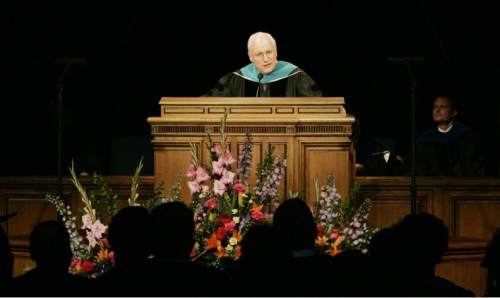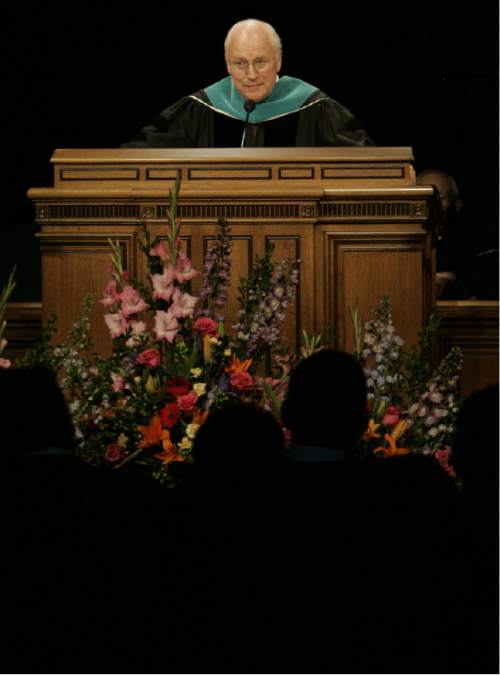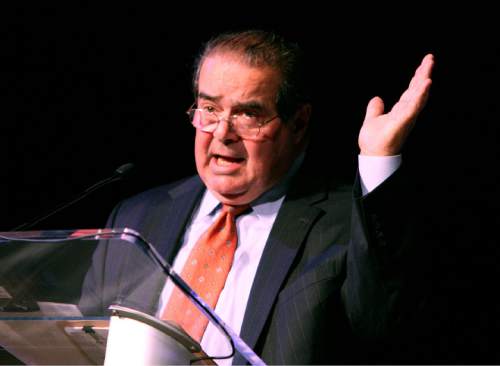This is an archived article that was published on sltrib.com in 2015, and information in the article may be outdated. It is provided only for personal research purposes and may not be reprinted.
Leave the handgun, bring the hardcover.
That's the warning from the University of Utah, which is barring guns at an upcoming speaking tour appearance by U.S. Supreme Court Justice Sotomayor.
The ban honors federal guidelines for justices' security, putting Utah law on hold. The state permits concealed weapon holders to tote guns on public university campuses.
The U.'s temporary prohibition — in effect for Sotomayor's speech promoting her memoir, "My Beloved World" — highlights the patchwork nature of Utah universities' security policies for high-profile speakers.
State legislators passed the law allowing guns on campus in 2004, blocking public schools from creating a policy that "in any way inhibits or restricts the possession or use of firearms."
At times, federal safety requirements have trumped the Utah law, depending on the venue and speaker. At other times, the decision seems to be left up to university administrators.
In October, Utah State University administrators made a very different call when feminist blogger Anita Sarkeesian asked them to ban guns at her speech on campus.
An anonymous emailer took aim at Sarkeesian, promising "the deadliest school shooting in American history" if she went forward with her critique of sexist video gaming culture.
Sarkeesian asked for metal detectors and bag searches — the very security measures that will be in place for Sotomayor's speech. But school administrators said state law prevented them from doing so.
After the threats, "Sarkeesian asked if weapons will be permitted at the speaking venue," USU said in a statement. "Sarkeesian was informed that, in accordance with the State of Utah law regarding the carrying of firearms, if a person has a valid concealed firearm permit and is carrying a weapon, they are permitted to have it at the venue."
Sarkeesian confirmed in a Tweet: "Forced to cancel my talk at USU after receiving death threats because police wouldn't take steps to prevent concealed firearms at the event."
She did not respond to a request for comment Friday.
Administrators at Utah's flagship institution maintain the Marshals' rules are not inconsistent with state law. The one-day ban, they say, is an anomaly.
"The University of Utah fully complies with Utah law," spokeswoman Maria O'Mara said in a statement Friday. "However, in accordance with federal security guidelines through the U.S. Marshals office, no guns or other weapons will be permitted at the venue for Justice Sotomayor's visit."
Anyone attending the speech should leave them behind, officials said, but the university will provide some gun storage for the event.
In the past, University of Utah presidents and staff have pushed back at lawmakers who wanted to allow guns throughout campus classrooms and dorms.
In 2011, former U. President Michael Young asked legislators to rethink the campus weapon law.
Current President David Pershing has not publicly picked up the effort. He could not be reached by phone Thursday or Friday.
When former Vice President Dick Cheney spoke at Brigham Young University in 2007, university administrators turned the Marriott Center over to the Secret Service. Audience members went through a full battery of security measures, including metal detectors. The private university owned by The Church of Jesus Christ of Latter-day Saints does not allow guns on campus.
But other prominent university speakers — including Supreme Court Justice Antonin Scalia, who came to Utah State University in 2008—have addressed full venues absent of metal detectors or gun-blocking measures.
It's not clear when the U.S. Marshals Office began requiring such measures for Supreme Court justices. The office did not respond to Tribune requests for comment Friday.
"Justice Scalia wasn't worried about that," said Utah Rep. Curt Oda, R-Clearfield, who met with the judge when he visited.
In recent months, Oda has emphasized the right to carry on campus. In October, he said he thought Sarkeesian was overreacting when she cancelled her appearance.
The chairman of the legislative committee on law enforcement, Oda sees no issue with the planned metal detectors and bag checks on the way in to see Sotomayor.
"That's a federal issue," he said. "As long as it's only for that venue and they don't shut down the entire campus, that's not really a problem."
For her part, Sotomayor made no special request for security, a Supreme Court spokeswoman said Friday in a statement. Instead, the U.S. Marshals Service and other law enforcement agencies arranged security.
Alex Butler, a senior anthropology major at the U. who leads discussion groups about Sotomayor's book, called the gun restriction "entirely reasonable."
"I don't see any reason you would need a gun at an academic lecture," she said.
Butler is considering becoming a civil rights lawyer and is "elated" Sotomayor is visiting. She plans to ask the justice for advice at a luncheon next week.
"I'd be really dissapointed to have speakers decline an invitation to come to our campus because they don't feel safe doing so," she said. Students, she added, "are here to learn. So that should be the primary goal."
@anniebknox
Supreme Court Justice speaks at the U.
When: Jan. 28 at noon; doors open at 10:30; all ticketholdsers must be seated by 11:45 a.m. Tickets are sold out for the free public speech, but standby seating may be available on the day of the event. Seating on a first-come, first-served basis; arriving early is encouraged.
What: Sotomayor is set to talk about themes in her new book, "My Beloved World."She was appointed as an associate justice of the Supreme Court in 2009 by President Barack Obama. She's the first Latina and the third woman to hold the position.
Submit questions: muse.utah.edu/sotomayor-event.







